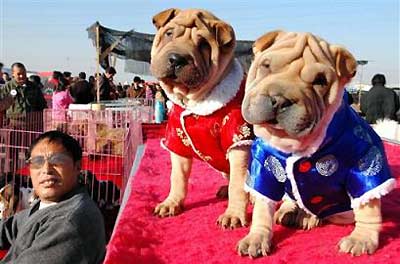|
China pets face bleak start to Year of the Dog
(Reuters)
Updated: 2006-01-27 15:18 Dogs in China face a bleak
start to the Year of the Dog as families trawl pet stores for gifts ahead of the
Spring Festival, animal rights activists say.
Just weeks after bringing cats and dogs home, many residents realise they are
too much like hard work and abandon them on the street.

A vendor sells dogs dressed in
Chinese style clothing at a dog market in Tongxian, a suburb of Beijing,
Saturday, Nov. 20, 2004. The three-month-old puppies were selling for 1200
Yuan (US$145.00) each. According to state media reports, one in 10 Beijing
families keeps a pet - despite high annual registration fees and
restrictions on when they can be walked in the streets. [AP
Photo] |
The phenomenon is expected to
be at its worst after the Lunar New Year holiday which begins on January 29,
heralding the Year of the Dog, which makes canines an auspicious seasonal gift.
"New year is twice as bad. Pick a year and then pick the animal," said Carol
Wolfson, founder and director of Second Chance Animal Aid, a nine-month-old
Shanghai organisation that runs an adoption and shelter programme for abandoned
pets.
"Pet stores pump them full of antibiotics to make them look cute and then
they die a few weeks later. Or else owners just put them out on the street when
they've had enough," Wolfson told Reuters.
Abandoned animals are the dark side of the explosion of pet ownership across
China in recent years. The national pet population hit nearly 300 million in
2004, up 20 percent from 1999, according to state media.
Raising dogs was banned under the rule of late Chinese leader Mao Zedong as a
bourgeois pastime and was only made legal a few years ago once living standards
rose with the economy.
While more people have the means to raise pets, many do not have the will to
provide long-term care.
Some dogs and cats end up being killed for their fur in barbaric conditions,
crammed into cages which are then thrown on to the ground, shattering their
bones, according to animal rights group People for the Ethical Treatment of
Animals (PETA).
"With the Summer Olympics in Beijing fast approaching, we hope the Chinese
government will take action to restore the damage that the fur industry has done
to the country's international reputation," PETA Asia Pacific director Jason
Baker said in a statement.
Abandoned dogs and cats fill cages on the second floor of the Shanghai Pet
Association, piles of excrement lying on the tiles beneath them.
"People just drop their pets off outside the door. Often the cats are sick
with skin disease or have infections," said Xia Jun, 24, who runs the centre.
Since it was founded in December, his organisation has built a network of
more than 60 "foster parents" who take of the animals after they are picked up
and vets give them check-ups.
Xia said the association aimed to rehouse 500 cats and dogs in 2006, but was
braced for the worst in coming weeks.
"We expect the dumping phenomenon to perhaps double over the new year
period," Xia said.
Some so-called animal protection organisations are not so altruistic -- many
have been found to be selling the cats and dogs they gather to restaurants, with
dogmeat widely believed to keep out the cold in winter.
|